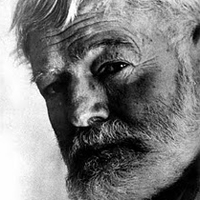In Another Country by Ernest Hemingway: Summary and Analysis
In Another Country is a story about war, written by the Noble Prize winner Ernest Hemingway, which deals with the experiences of an unnamed army officer who describes the events and the experiences of war in first person narrative. This is the story of a man who has been completely cut off from his family and his country. He also lacks close friends with whom he can share his inner feelings.

Ernest Hemingway (1898-1961)
The narrator in the story is an American soldier who has been wounded in a war in Italy during the First World War. His leg is being treated with a new machine. The doctor says that his leg will be just like as it was before the war. Getting treatment along with him is the major and three young soldiers from Milan. But none of them, including the narrator, seem to have faith upon the machines and their complete recovery. Through the narrator and others in this story, Hemingway explores the problem of finding a code of values that give coherence and meaning to an uprooted existence.
The narrator appears to be on friendly terms with the major and the three boys. He finds himself even closer to a young boy who has lost his nose during the war. They lead a secluded life and go to the hospital every day. They are cut off from the world of war and soldiers and also from their families.
In their present "country" there is much dead game hanging outside the shops. The wind is blowing the dead birds, and the snow is falling on the furs of the foxes. There are many ways to go to the hospital. The ways alongside the canals are long, but when they walk along the short way the civilians hate them. Sometimes the officers go to the Cafe Cova. When he remembers the patriotism of the cafe girls the speaker's tone of voice becomes bitter. These girls do not know the horror of the war sitting inside the rich and warm rooms. That is why they idealize patriotism. But the soldiers frequently want to go the cafe to see the girls. The narrator is not a true "hawk" like his companions. He got the medal because he was an American and because he was wounded. But being wounded in war is really an accident. The narrator is afraid to die, so he can never do any brave action as shown by the other three soldiers. But, when his companions know this, their attitude toward him changes. The narrator likes another boy who was wounded without showing his bravery. The major also goes to the hospital. He is attempting to live in a realistic "country". He is interested in the speaker's grammar. He does not believe in bravery in spite of being a great fencer. He uses the machine dutifully although he knows that the machine will not improve his hand. He married a young girl after he retired from the active service through the wound. But the girl dies of pneumonia. This event shocked the major. Therefore, he advises the speaker not to marry. If he marries, he will lose his wife. But if he does not marry, he will lose nothing. The memory of his wife's death troubles the major and he does not come to the hospital for three days. When he comes, he does not pay any attention to the three photographs of hands like his that were completely restored.
The story begins with useless discourse and the narrator’s description of the barren world. There happens, nothing very significant throughout the story, and the story does not have a proper and clear exposition nor a meaningful conflict or resolution. This is an uneventful story where there is very little action and little is said. With this objective description the story highlights the loneliness and hopelessness of the soldiers. Soldiers neither have glorious memories of the past nor hopeful dreams for the future. They are living an uprooted, secluded life far away from the places they belong to. War brings nothing but loss. The present story is a story of loss in which the narrator has lost his knee, a boy has lost his nose and the major has lost his hand. All they received in return are the medals and contempt.
